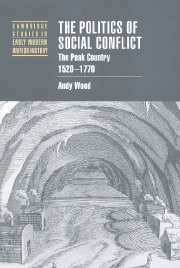Book contents
- Frontmatter
- Contents
- List of figures
- List of tables
- List of maps
- Preface
- List of abbreviations
- Introduction ‘Terms we did not understand’: landscape, place and perceptions
- 1 Social relations and popular culture in early modern England
- Part I The structures of inequality
- Part II The conditions of community
- Part III The politics of social conflict
- 9 ‘Pyllage uppon the poore mynorz’: sources of social conflict, 1500-1600
- 10 ‘All is hurly burly here’: local histories of social conflict, 1600-1640
- 11 The peak in context: riot and popular politics in early Stuart England
- 12 ‘Prerogative hath many proctors’: the English Revolution and the plebeian politics of the Peak, 1640–1660
- 13 The experience of defeat? The defence of custom, 1660–1770
- 14 The making of the English working class in the Derbyshire Peak Country
- Bibliography
- Index
- Cambridge Studies in Early Modern British History
13 - The experience of defeat? The defence of custom, 1660–1770
Published online by Cambridge University Press: 27 July 2009
- Frontmatter
- Contents
- List of figures
- List of tables
- List of maps
- Preface
- List of abbreviations
- Introduction ‘Terms we did not understand’: landscape, place and perceptions
- 1 Social relations and popular culture in early modern England
- Part I The structures of inequality
- Part II The conditions of community
- Part III The politics of social conflict
- 9 ‘Pyllage uppon the poore mynorz’: sources of social conflict, 1500-1600
- 10 ‘All is hurly burly here’: local histories of social conflict, 1600-1640
- 11 The peak in context: riot and popular politics in early Stuart England
- 12 ‘Prerogative hath many proctors’: the English Revolution and the plebeian politics of the Peak, 1640–1660
- 13 The experience of defeat? The defence of custom, 1660–1770
- 14 The making of the English working class in the Derbyshire Peak Country
- Bibliography
- Index
- Cambridge Studies in Early Modern British History
Summary
The miners' defeat in Haddonfields concluded the last attempt to extend the free mining laws of the King's Field. Over the forty years that followed, free mining rights were subject to continuous, piecemeal erosion. Miners were unable to mount effective resistance to attacks upon their rights due to the coincidence of important economic and social changes with the declining sympathy of law courts for their cause. After 1660, the small but important group of mercantile lesser gentry who had often hitherto supported the miners sided instead with the manorial interest. The gentry's and nobility's hand was greatly strengthened by the close grip which leading families developed upon local office within the Peak, which prevented the miners from exploiting any internal elite divisions. The dramatic fall in the price of lead which occurred between the late 1660s and the 1690s hit the free miners hard, coming as it did at the same time as large-scale enclosure. Both the industrial and agrarian sources of the free miners' economic independence were therefore undercut, and the close network upon which their collective opposition had been mounted was broken down. Finally, the Court of the Duchy of Lancaster, hitherto a generally consistent supporter of the free mining interest, reversed a number of its pre-war rulings to side with the manorial interest. It should therefore be unsurprising to find that the free miners' resistance to these developments was generally disorganized and ineffective.
- Type
- Chapter
- Information
- The Politics of Social ConflictThe Peak Country, 1520–1770, pp. 295 - 315Publisher: Cambridge University PressPrint publication year: 1999



